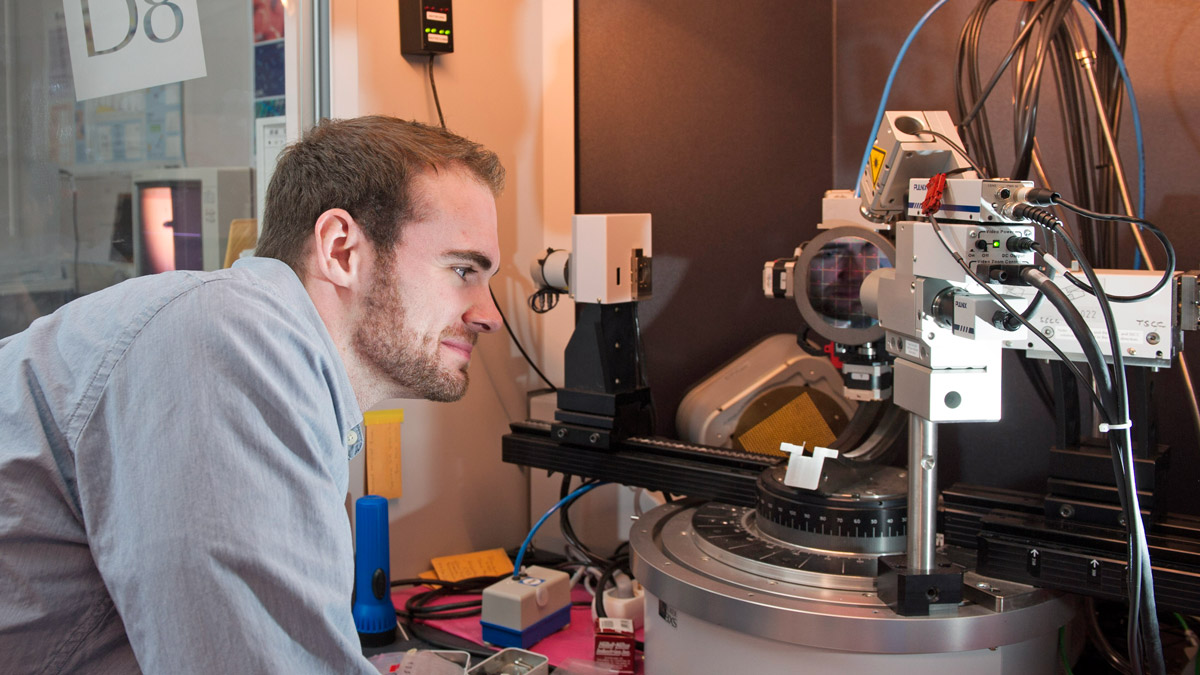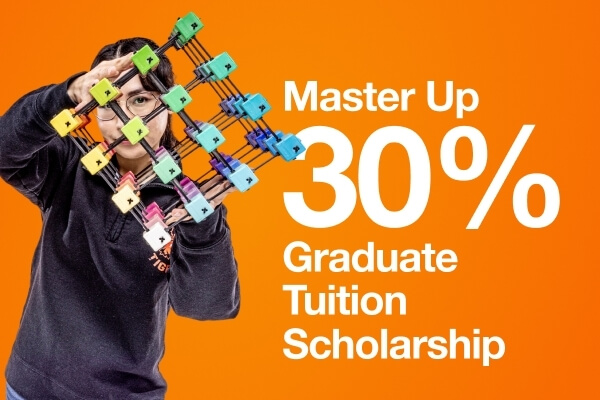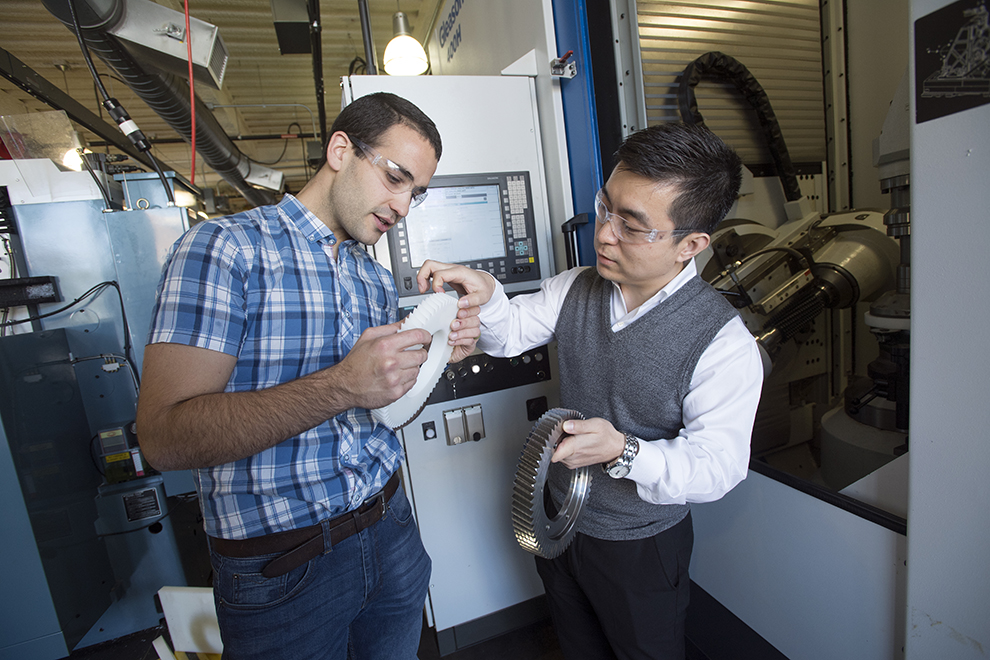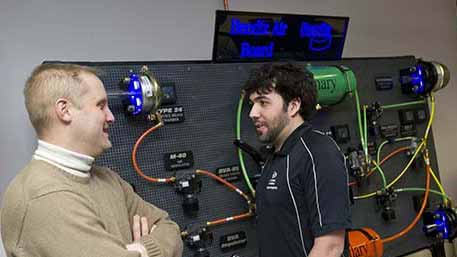Mechanical Engineering Master of Engineering Degree

Mechanical Engineering
Master of Engineering Degree
- RIT /
- College of Engineering /
- Academics /
- Mechanical Engineering ME
Overview for Mechanical Engineering ME
Why Pursue a Mechanical Engineering ME at RIT?
STEM-OPT Visa Eligible: The STEM Optional Practical Training (OPT) program allows full-time, on-campus international students on an F-1 student visa to stay and work in the U.S. for up to three years after graduation.
Wide Range of Focus Areas: Choose from a wide array of focus area courses and electives to align your degree with your professional goals and interests.
Optional Cooperative Education: Gain valuable employment experience in your field by participating in a co-op.
Flexible Capstone Experience: Choose from a design project leadership course or an industrial internship to complete your degree.
The graduate program for mechanical engineering prepares graduates to support the design of engineered systems through the application of the fundamental knowledge, skills, and tools of mechanical engineering. Students will work independently as well as collaboratively with leaders in industry, while demonstrating the professional and ethical responsibilities of the engineering profession. Ultimately, graduates of the master's in mechanical engineering will enhance their skills through formal education and training, independent inquiry, and professional development.
RIT’s Mechanical Engineering ME
The master's in mechanical engineering is intended to be a terminal degree program designed for those who do not expect to pursue a doctoral degree, but who wish to become a leader within the mechanical engineering field. This graduate program for mechanical engineering is particularly well-suited for students who wish to study part time, for those interested in updating their technical skills, or for those who are not focused on a research-oriented master of science degree, which requires a thesis. A conventional thesis is not required for the program. In its place, students complete a capstone experience, which may be a design project leadership course or a well-organized and carefully chosen industrial internship. A research methods course may also fulfill the capstone experience; however, this option is primarily intended for students who are considering transitioning to the MS program in mechanical engineering. Courses taken within the ME program are transferable to the mechanical engineering MS program.
Mechanical Engineering ME Courses
The mechanical engineering ME prepares graduates to:
- Practice mechanical engineering in support of the design of engineered systems through the application of the fundamental knowledge, skills, and tools of mechanical engineering.
- Enhance their skills through formal education and training, independent inquiry, and professional development.
- Work independently as well as collaboratively with others while demonstrating the professional and ethical responsibilities of the engineering profession.
In addition to required courses, students choose focus area courses and electives that customize the master's in mechanical engineering around their professional goals and interests. Focus areas include automotive systems, business, controls, manufacturing, mechanics-design/materials, product development, sustainability, thermo/fluids engineering, and vibrations engineering.
All full-time students attend a weekly graduate seminar each semester they are on campus. Up to three courses may be taken outside the mechanical engineering department. Students may complete the mechanical engineering ME requirements within one calendar year with summer study. Students may also augment their education through cooperative education employment opportunities. Although co-op is not a requirement of the program, it provides students an opportunity to gain valuable employment experience within the field.
-
Affordable Now. Valuable for Life.
Earn your master’s degree without the full price tag. With Master Up you can receive a 30% tuition scholarship for an RIT master’s degree.
-
Join us for Fall 2026
Many programs accept applications on a rolling, space-available basis.
Careers and Experiential Learning
Typical Job Titles
| Process Engineer | Propulsion Engineer | Structural Engineer |
| Vehicle Verification Engineer | Mechanical Engineer | Research and Development Engineer |
| Test Engineer | Weapons and Complex Integration Researcher |
Cooperative Education and Internships
What makes an RIT education exceptional? It’s the opportunity to complete relevant, hands-on engineering co-ops and internships with top companies in every single industry. At the graduate level, and paired with an advanced degree, cooperative education and internships give you the unparalleled credentials that truly set you apart. Learn more about graduate co-op and how it provides you with the career experience employers look for in their next top hires.
Cooperative education is strongly encouraged for graduate students in the ME in mechanical engineering.
Featured Work and Profiles
-
Alumnus Combines Engineering and Design to Launch Startups
Ryan Larcom ’07 (mechanical engineering), ’07 ME (mechanical engineering, industrial design) is innovation executive at High Alpha Innovation, where he helps businesses bring to market life...
Read More about Alumnus Combines Engineering and Design to Launch Startups -
Mistysyn Earns Outstanding Graduate Woman Award
RIT engineering student Morgan Mistysyn received the Outstanding Graduate Woman Award for her leadership in Engineers for a Sustainable World and contributions to her field.
Read More about Mistysyn Earns Outstanding Graduate Woman Award -
Professor Leads Development of Seal-Inspired Underwater Sensors
RIT's Xudong Zhang and his team have received a grant to develop innovative underwater sensors modeled after seal whiskers to enhance detection and tracking capabilities.
Read More about Professor Leads Development of Seal-Inspired Underwater Sensors
Curriculum for 2025-2026 for Mechanical Engineering ME
Current Students: See Curriculum Requirements
Admissions and Financial Aid
This program is available on-campus only.
| Offered | Admit Term(s) | Application Deadline | STEM Designated |
|---|---|---|---|
| Full‑time | Fall or Spring | Rolling | Yes |
| Part‑time | Fall or Spring | Rolling | No |
Full-time study is 9+ semester credit hours. Part-time study is 1‑8 semester credit hours. International students requiring a visa to study at the RIT Rochester campus must study full‑time.
Application Details
To be considered for admission to the Mechanical Engineering ME program, candidates must fulfill the following requirements:
- Complete an online graduate application.
- Submit copies of official transcript(s) (in English) of all previously completed undergraduate and graduate course work, including any transfer credit earned.
- Hold a baccalaureate degree (or US equivalent) from an accredited university or college in mechanical engineering, physics, or a related field. A minimum cumulative GPA of 3.0 (or equivalent) is recommended.
- Submit a current resume or curriculum vitae.
- Submit a personal statement of educational objectives.
- Submit two letters of recommendation.
- Entrance exam requirements: GRE optional for Fall 2026 applicants
- Submit English language test scores (TOEFL, IELTS, PTE Academic, etc.), if required. Details are below.
English Language Test Scores
International applicants whose native language is not English must submit one of the following official English language test scores. Some international applicants may be considered for an English test requirement waiver.
Duolingo (DET): 120
IELTS: 6.5
LanguageCert Academic: 70
PTE Academic: 56
TOEFL: 79/4.5
International students below the minimum requirement may be considered for conditional admission. Deaf and hard-of-hearing test takers with significant hearing loss do not need to take the listening and speaking sections for the TOEFL and IELTS. Each program requires balanced sub-scores when determining an applicant’s need for additional English language courses.
How to Apply Start or Manage Your Application
Cost and Financial Aid
An RIT graduate degree is an investment with lifelong returns. Graduate tuition varies by degree, the number of credits taken per semester, and delivery method. View the general cost of attendance or estimate the cost of your graduate degree.
A combination of sources can help fund your graduate degree. Learn how to fund your degree
Accreditation
Research
The faculty and students in the Kate Gleason College of Engineering are engaging in numerous areas of research, which takes place across all of our engineering disciplines and often involves other colleges at RIT, local health care institutions, and major industry partners. Explore the college's key research initiatives to learn more about our research in:
Related News
-
November 19, 2025

Club sports help students find their fit
Club sports are a big part of student life at the university. Every year, about 2,000 students are involved with the nearly 50 different club sports. For many, it scratches that competitive itch. For others, it’s a chance to try something new, find a community, and stay active.
-
September 3, 2024

Byron Erath joins RIT as mechanical engineering department head
Faculty-researcher brings expertise in using engineering principles to bio-inspired technology solutions
-
May 1, 2024

What’s being made in the SHED
Making at RIT has hit a new level now that several makerspaces in the Student Hall for Exploration and Development (SHED) have opened to provide students access to equipment and support for classwork, club advancement, and personal projects.
Contact
- Lindsay Lewis
- Senior Assistant Director
- Graduate Admissions
- Enrollment Management
- 585‑475‑5532
- lslges@rit.edu
- Sarilyn Ivancic
- Graduate Program Director, Mechanical Engineering
- Department of Mechanical Engineering
- Kate Gleason College of Engineering
- 585‑475‑6003
- srieme@rit.edu
Department of Mechanical Engineering















